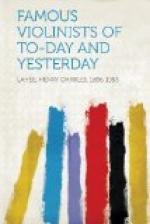Eduard Rappoldi, the leader of the Royal Court Orchestra at Dresden, has a high reputation as a sound and earnest player and excellent teacher. He was born in Vienna in 1839, and was at one time a teacher in the Hochschule at Berlin, but went to Dresden in 1877.
CHAPTER VIII.
JOACHIM.
Joseph Joachim is one of the musical giants of the nineteenth century. He will be remembered as one whose life has been interwoven with the lives of the greatest musicians of his day, as one of the greatest educators in his line who ever lived, and as the embodiment of the purest and highest ideas in public performance.
[Illustration: JOSEPH JOACHIM]
Joachim is called the greatest violinist of modern times, and no better words can be found to describe his characteristics than those of Wasielewski, who says: “Joachim’s incomparable violin playing is the true chef-d’oeuvre, the ideal of a perfect violinist (so far as we present-day critics can judge). Less cannot, dare not, be said, but, at the same time, more cannot be said of him or of any one, and it is enough. But that which raises him above all other contemporary violinists and musicians generally is the line he takes in his professional life. He is no virtuoso in the ordinary sense, for he is far more,—before all he will be a musician. And that he unquestionably is,—a magnificent example to young people, who are to some extent possessed of the demon of vanity, of what they should do and what they should leave undone. Joachim makes music, and his preeminent capabilities are directed toward the serving one true, genuine art, and he is right.”
Joachim was born on June 28, 1831, in the village of Kittsee, in Hungary, within the small radius which has produced three other great musicians,—Haydn, Hummel, and Liszt. He began to study the violin when he was five years old, and was placed under Servaczinski, leader of the opera orchestra at Pesth. In two years he made his first public appearance at a concert at Pesth, when he played a duet concerto for two violins and orchestra with his master, and a solo on a theme by Schubert, with variations. He was now (1841) sent to Vienna, where he entered the conservatoire and studied under Boehm for two years. At the end of this time he went to Leipzig, where he met with Mendelssohn and played in a concert of Madame Viardot’s. A few months later he appeared as a finished artist in a Gewandhaus concert, and played Ernst’s “Otello Fantasie.” Leipzig was then, under Mendelssohn’s guidance, in the zenith of its fame, and for a boy of twelve to appear in a Gewandhaus concert and earn, not only the applause of the audience, but also the praise of the critics, was something very unusual. But a still greater honour was in store for him,—the following year he took part, in a Gewandhaus concert, in a concertante for four violins by Maurer, the other performers being Ernst, Bazzini, and David, all violinists of renown and very much his seniors.




